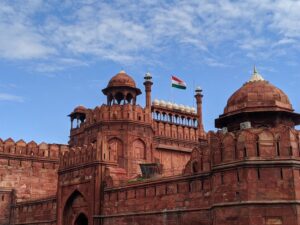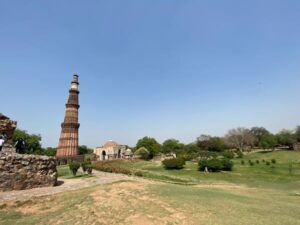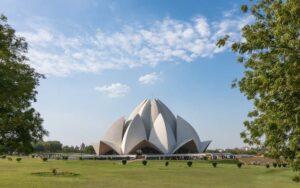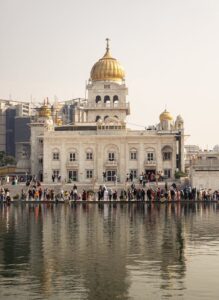Let’s explore delhi
Delhi, officially known as the National Capital Territory of Delhi (NCT), is a vibrant and historically significant city located in northern India. It serves as the capital of India and is one of the country’s 11 districts. Delhi is known for its rich history, diverse culture, and a mix of modern and traditional elements. Here are some key aspects and information about Delhi:
Delhi Historical Significance:
Delhi has a long and illustrious history dating back thousands of years. It has been a significant center for various empires and dynasties, including the Maurya, Gupta, Mughal, and British Empires. Each of these periods has left a mark on the city’s architecture, culture, and heritage.
Geography: It is situated in the northern part of India and is bordered by the states of Haryana and Uttar Pradesh. The city is divided into two main parts: Old Delhi (Shahjahanabad) and New Delhi (the area designed by British architects during colonial rule).
Government:It is a special territory with its own government, known as the Government of the National Capital Territory of Delhi (GNCTD). It has a unique political setup with a Chief Minister and a Lieutenant Governor. The President of India also plays a role in the administration of Delhi.
Landmarks and Monuments:
- It is home to numerous historic landmarks and monuments, including:
- Red Fort
- Qutub Minar
- India Gate
- Humayun’s Tomb
- Lotus Temple
- Akshardham Temple
- Jama Masjid
- Raj Ghat (Mahatma Gandhi’s memorial)

Culture and Cuisine: It is known for its diverse and vibrant culture. It is a melting pot of different cultures and religions, which is reflected in its festivals, music, dance, and art forms. The city also offers a wide range of culinary experiences, with street food like chaat, kebabs, and parathas being particularly popular.
Education: It is home to several prestigious educational institutions, including the University of Delhi, Jawaharlal Nehru University (JNU), and the Indian Institutes of Technology (IITs). It is a hub for higher education in India.
Economy:It has a diverse and growing economy. It is a major center for commerce, trade, and industry in India. Key sectors include information technology, telecommunications, manufacturing, tourism, and services.
Transportation:It has a well-developed transportation network. It is served by the Indira Gandhi International Airport, one of the busiest airports in India. The city also has an extensive metro system, buses, and a network of roads and highways.
Pollution: It has faced significant challenges with air pollution, particularly during the winter months.
Most Famous Places In Delhi.
Delhi, the capital of India, is a city rich in history, culture, and landmarks. Here are some of the most famous places to visit in Delhi:
- Red Fort (Lal Qila): A UNESCO World Heritage Site, the Red Fort is an iconic symbol of India’s rich history. It was built by the Mughal Emperor Shah Jahan and is known for its stunning red sandstone architecture.
- Qutub Minar:Another UNESCO World Heritage Site, the Qutub Minar is a towering minaret made of red sandstone and marble. It is an impressive example of Indo-Islamic architecture.

- India Gate: This war memorial is an iconic landmark in Delhi and honors the Indian soldiers who died in World War I. It is particularly beautiful when lit up at night.
- Humayun’s Tomb:A precursor to the Taj Mahal, this tomb is the final resting place of Emperor Humayun. It is renowned for its Mughal architecture and well-maintained gardens.
- Lotus Temple:Known for its distinctive lotus-shaped design, this Bahá’í House of Worship is a serene place for meditation and prayer. It’s also known for its architectural beauty.

- Akshardham Temple: This grand Hindu temple complex showcases Indian culture, spirituality, and architecture. The central monument is a sight to behold, and the surrounding gardens are beautifully landscaped.
- Jama Masjid: India’s largest mosque, Jama Masjid, is an architectural marvel of the Mughal era. Visitors can climb its minarets for panoramic views of Old Delhi.
- Raj Ghat:This simple yet poignant memorial marks the spot where Mahatma Gandhi was cremated. It is a peaceful place for reflection.
- Rashtrapati Bhavan: The official residence of the President of India, this grand building is an architectural masterpiece. You can visit the Mughal Gardens during the spring when they are open to the public.
- National Museum:Located in New Delhi, this museum houses an extensive collection of art, artifacts, and archaeological exhibits that provide insights into India’s history and culture.
- National Gallery of Modern Art (NGMA): Art enthusiasts will appreciate this gallery’s collection of modern and contemporary Indian art.
- Chandni Chowk: A bustling market in Old Delhi, Chandni Chowk is famous for its street food, shopping, and the historic Jama Masjid.
- Hauz Khas Village: This trendy neighborhood is known for its cafes, boutiques, and historical Hauz Khas Complex, which includes a medieval water tank and mosque.
- Dilli Haat: This open-air market offers handicrafts, art, and cuisine from different states of India, making it a great place to experience India’s diversity.
- Gurudwara Bangla Sahib: This Sikh temple is known for its serene atmosphere and the free community kitchen (langar) that serves food to thousands of people daily.

These are just a few of the many attractions Delhi has to offer. The city’s rich history and vibrant culture make it a must-visit destination for travelers.
Why do we travel delhi?
People travel to Delhi for a variety of reasons, as Delhi is a vibrant and culturally rich city in India with a lot to offer. Here are some common reasons people visit Delhi:
- Tourism: Delhi is home to numerous historical and cultural landmarks, including the Red Fort, Qutub Minar, India Gate, Humayun’s Tomb, and Lotus Temple. Tourists come to explore these iconic attractions and learn about India’s history and culture.
- Business: Delhi is a major economic hub in India and home to numerous businesses, corporations, and government offices. Many people travel to Delhi for business meetings, conferences, and other work-related purposes.
- Education:Delhi is known for its prestigious educational institutions, including the University of Delhi, Jawaharlal Nehru University, and the Indian Institutes of Technology (IITs). Students from across India and around the world come to Delhi for higher education.
- Medical Tourism:It has some world-class hospitals and healthcare facilities, making it a destination for people seeking medical treatment and surgeries.
- Cultural Experiences:Delhi offers a diverse range of cultural experiences, from traditional Indian music and dance performances to art exhibitions and street food festivals.
- Shopping: The city has a thriving market culture, with numerous markets and bazaars where you can shop for traditional Indian clothing, jewelry, handicrafts, and more
- Food: It is famous for its street food, including chaat, kebabs, and parathas. Many people visit the city to savor its culinary delights.it food scene is a tantalizing journey through the heart of India’s culinary diversity. From the indulgent Chole Bhature to the fragrant Biryani, street food treasures like Golgappa and spicy Aloo Paratha, and the creamy richness of Butter Chicken, every bite is an explosion of flavors. Whether in traditional eateries or bustling street stalls, Delhi’s cuisine is a feast for the senses.
- Religious Tourism: It is home to a variety of religious sites, including the Jama Masjid, Akshardham Temple, and Gurudwara Bangla Sahib. Pilgrims and tourists visit these places for spiritual experiences.
- Festivals and Events:It hosts a wide range of festivals and events throughout the year, such as Diwali, Holi, and the International Film Festival of India, which attract visitors from all over.
- Historical and Architectural Interest: For those interested in history and architecture, It ancient ruins, Mughal-era buildings, and colonial-era structures offer a wealth of exploration opportunities.
- Government and Diplomacy: It serves as the political capital of India, and people working in government, politics, and diplomacy often travel to the city for official business.
- Connectivity:It is well-connected to other major cities in India and serves as a transportation hub, making it a convenient starting point for travelers exploring the country.
.
